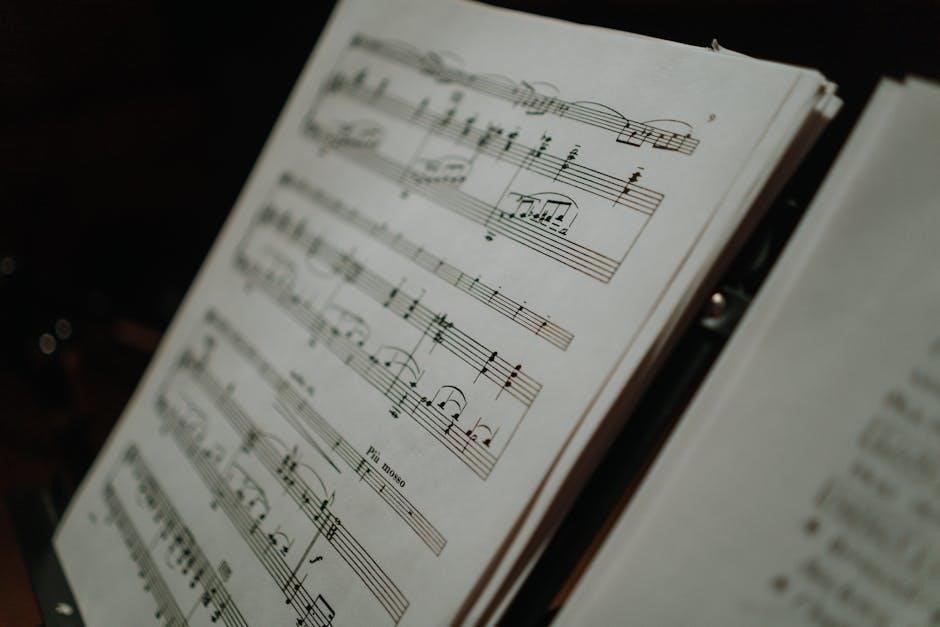The RCM Level 5 Theory Practice Exam is a crucial step in music education, assessing knowledge of harmony, notation, and music history. It prepares students for advanced studies and professional opportunities in music, emphasizing the importance of theoretical understanding. The exam is structured to evaluate comprehension of musical elements and their application. Students can benefit from practice exams and study resources available online to ensure readiness and success.

1.1 Overview of the RCM Level 5 Exam
The RCM Level 5 Theory Exam is a comprehensive assessment designed to evaluate a student’s understanding of advanced musical concepts. It covers topics such as harmony, counterpoint, composition, and music history. The exam includes multiple-choice questions, ear training tasks, and analytical exercises to test both theoretical knowledge and practical application. Students are required to demonstrate a deep understanding of musical structures, historical contexts, and compositional techniques. The exam is a crucial milestone for musicians aiming to progress in their studies or pursue professional careers. Proper preparation, including the use of practice exams and study materials, is essential for success. The exam format ensures a thorough evaluation of a student’s musical proficiency and readiness for higher-level studies.
1.2 Importance of Theory in Music Education
Theory serves as the foundation of music education, enabling students to understand the language and structure of music. It enhances their ability to read, write, and perform music with precision and artistry. Through theory, students gain insights into historical contexts, compositional techniques, and harmonic structures, which are essential for both performance and composition. The RCM Level 5 Theory Exam ensures that students have a comprehensive understanding of these concepts, preparing them for advanced studies and professional opportunities in music. Mastery of theory also fosters creativity and critical thinking, allowing musicians to interpret and innovate within their craft. Thus, theory is not just an academic requirement but a vital tool for lifelong musical growth and appreciation.

Exam Structure and Format
The RCM Level 5 Theory Exam consists of multiple-choice questions, composition tasks, and music history components. It is divided into sections, each testing specific skills, with a time limit. Candidates must demonstrate understanding of harmony, notation, and historical contexts. The exam format ensures a comprehensive assessment of theoretical knowledge, preparing students for advanced musical studies and professional opportunities.

2.1 Multiple-Choice Questions in the Exam
The RCM Level 5 Theory Exam features multiple-choice questions that test students’ knowledge of harmony, musical notation, and terminology. These questions assess understanding of scales, key signatures, chord progressions, and musical forms. Students are required to identify correct answers from a set of options, demonstrating their ability to analyze and apply theoretical concepts. The multiple-choice format ensures a fair and objective evaluation of knowledge. Proper preparation involves reviewing theory textbooks and practicing with sample questions to build confidence and accuracy. These questions are designed to evaluate both factual knowledge and the ability to think critically about musical elements. They are an essential part of the exam, showcasing a student’s grasp of fundamental theory principles.
2.2 Composition and Ear Training Tasks
The RCM Level 5 Theory Exam includes composition and ear training tasks to assess students’ practical skills. Composition tasks may involve creating short melodies or harmonizing simple chorales, while ear training exercises test the ability to identify intervals, chord progressions, and rhythms. These tasks evaluate creativity, pitch recognition, and understanding of musical structure. Students are encouraged to practice composing and transcribing music to improve their skills. Ear training can be enhanced through regular listening exercises and practicing with recorded examples. These sections are designed to ensure students can apply theoretical knowledge in practical musical contexts, reinforcing their overall understanding of music theory and preparation for higher levels of study. Regular practice with sample tasks is highly recommended to build confidence and accuracy in these areas.
2.3 Music History Components
The RCM Level 5 Theory Exam includes a music history component, testing knowledge of major composers, genres, and stylistic developments across different historical periods. Students are expected to identify and describe key characteristics of music from the Baroque, Classical, Romantic, and Modern eras. The exam may include questions about specific composers, such as Bach, Beethoven, or Mozart, and their contributions to music. Additionally, students may be asked to recognize and analyze musical excerpts or describe historical musical forms. This section evaluates understanding of the cultural and historical context of music, fostering a deeper appreciation of musical heritage. Regular study of music history textbooks and practice exams is essential for success in this area, ensuring familiarity with key concepts and terminology.

Preparation Strategies

Effective preparation involves setting a study schedule, using recommended textbooks, and practicing with past exam papers. Utilize online resources like PDFs for targeted review and improvement.
3.1 Recommended Textbooks and Resources
For success in the RCM Level 5 Theory exam, it is essential to use high-quality study materials. The Royal Conservatory of Music recommends textbooks such as RCM Celebrate Theory, which provides comprehensive coverage of harmony, notation, and music history. Additionally, supplementary resources like RCM Theory Level 5 Practice Exams and Ear Training Workbooks are invaluable for targeted practice. Online platforms offer PDF versions of past papers and study guides, allowing students to familiarize themselves with exam formats and question types. Utilizing these resources alongside structured study plans ensures thorough preparation and mastery of theoretical concepts.
3.2 Utilizing Practice Exams Effectively
Practice exams are a cornerstone of effective preparation for the RCM Level 5 Theory exam. They simulate real test conditions, helping students familiarize themselves with question formats, timing, and content. Start by completing untimed practice exams to build foundational knowledge, then progress to timed sessions to enhance time management skills. Reviewing answers and analyzing mistakes is crucial for improvement. Utilize official RCM practice exam PDFs and supplementary materials to ensure exposure to a variety of questions. Consistent practice fosters confidence and readiness, enabling students to approach the actual exam with poise and precision.
3.3 Study Techniques for Success

Effective study techniques are essential for excelling in the RCM Level 5 Theory exam. Active recall and spaced repetition are powerful methods to reinforce musical concepts and terminology. Dedicate time to creating flashcards for key terms and regularly review them. Practice composing short melodies or harmonies to apply theoretical knowledge creatively. Engage with music aurally by listening to examples of periods and styles covered in the exam. Use mnemonics to remember complex concepts like chord progressions or musical forms. Regular review of past exam questions and practice exams helps identify weak areas. Maintain a structured study schedule, balancing theory with practical music-making. Combining these strategies ensures a well-rounded preparation for the exam.

Common Challenges and Solutions
Common challenges include managing time, analyzing music effectively, and avoiding errors. Solutions involve structured study plans, thorough practice, and careful review of exam instructions and content.
4.1 Managing Time During the Exam
Managing time effectively during the RCM Level 5 Theory Exam is crucial for success. Allocate specific minutes to each section based on the number of questions and their complexity. Start with multiple-choice questions to secure foundational marks quickly. Dedicate sufficient time to composition and ear training tasks, as these often require detailed responses. For music history components, ensure you leave enough time to address each question thoroughly. Practice exams are invaluable for refining time management skills, helping you identify areas where you may need to work more efficiently. Staying calm and adhering to your time plan will help you complete all sections confidently.
4.2 Approaching Music Analysis Questions
Music analysis questions in the RCM Level 5 Theory Exam require a systematic approach. Begin by carefully reading the question and identifying key elements such as key signatures, scales, and chord progressions. Focus on understanding the musical structure, including form, themes, and transitions. Practice identifying harmonies, dynamics, and articulation markings, as these are often focal points. Use practice exams to refine your ability to analyze excerpts effectively. When answering, prioritize clarity and conciseness, ensuring your responses address all parts of the question. Breaking down the question into smaller components can help you tackle complex analysis tasks methodically. Regular practice with sample questions will enhance your analytical skills and confidence.
4.3 Avoiding Common Mistakes
Common mistakes in the RCM Level 5 Theory Exam often stem from insufficient preparation or misinterpretation of questions. Many students rush through tasks, leading to errors in notation, harmony, or analysis. Misreading instructions or neglecting to address all parts of a question is another frequent issue. To avoid these pitfalls, thoroughly review practice exams and focus on understanding each question’s requirements. Pay attention to details like key signatures, dynamics, and articulation. Regularly practicing composition and ear training tasks can improve accuracy. Additionally, ensure a strong grasp of music history and theory concepts. By identifying and addressing these areas, students can minimize errors and achieve better results. Consistent practice and careful review are essential for success in the exam.

Benefits of Passing the Exam
Passing the RCM Level 5 Theory Exam enhances musical knowledge, demonstrates dedication, and advances career opportunities in music education and performance. It validates theoretical understanding and practical application.
5.1 Enhancing Musical Knowledge
Passing the RCM Level 5 Theory Exam significantly enhances musical knowledge by deepening understanding of harmony, notation, and music history. Students gain proficiency in analyzing musical scores, identifying composers, and recognizing historical contexts. The exam reinforces theoretical concepts, enabling better comprehension of complex compositions. It also improves practical skills, such as composition and ear training, which are essential for musicians. By mastering these elements, students develop a stronger foundation for advanced musical studies and performance. The exam serves as a milestone, demonstrating a high level of theoretical proficiency and preparing individuals for lifelong musical appreciation and professional opportunities.
5.2 Advancing Career Opportunities
Passing the RCM Level 5 Theory Exam opens doors to advanced career opportunities in music. It demonstrates a high level of theoretical understanding, making candidates more competitive in professional settings. The certification is recognized by educational institutions and employers, often serving as a prerequisite for music-related careers. Musicians, educators, and composers benefit from this credential, as it validates their expertise in music theory. Additionally, it prepares students for higher-level certifications and degrees, providing a strong foundation for further musical study. The exam equips individuals with skills that are highly valued in the music industry, ensuring they are well-prepared for both academic and professional pursuits in music.

Accessing Exam Resources
Accessing RCM Level 5 Theory Practice Exam resources is straightforward. Official RCM publications, such as Celebrate Theory Level 5, provide comprehensive study materials. Additionally, practice exam PDFs and supplementary guides are available online, offering students ample preparation tools to succeed;
6.1 Finding Reliable Practice Exam PDFs
Finding reliable RCM Level 5 Theory Practice Exam PDFs is essential for effective preparation. The Royal Conservatory of Music (RCM) offers official practice exams and resources on their website, ensuring authenticity and relevance. Additionally, reputable music stores and educational platforms provide downloadable PDFs that align with the exam format. Many students also benefit from forums and communities where past examinees share their resources. When sourcing PDFs, prioritize official or RCM-endorsed materials to avoid inaccuracies. These practice exams are invaluable for familiarizing oneself with the structure, question types, and content depth. Using these resources strategically can significantly enhance exam readiness and confidence.
6.2 Supplementary Study Materials
Beyond practice exams, supplementary study materials are key to mastering the RCM Level 5 Theory exam. Textbooks like Celebrate Theory and Theory of Music Made Easy provide in-depth lessons and exercises; Online study guides and interactive tools, such as flashcards and video tutorials, cater to diverse learning styles. Many websites offer detailed breakdowns of music history and composition techniques, aligning with exam requirements. Additionally, some platforms provide digitized versions of past exams and model answers, allowing students to analyze their performance. These resources complement practice exams by offering a deeper understanding of complex concepts, ensuring comprehensive preparation for both the practical and theoretical aspects of the exam.



